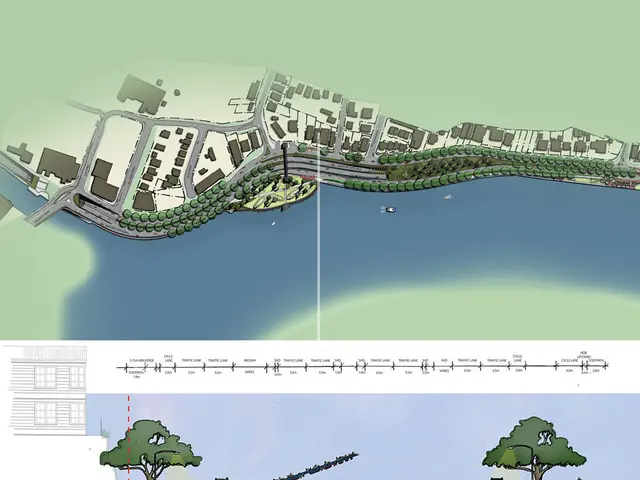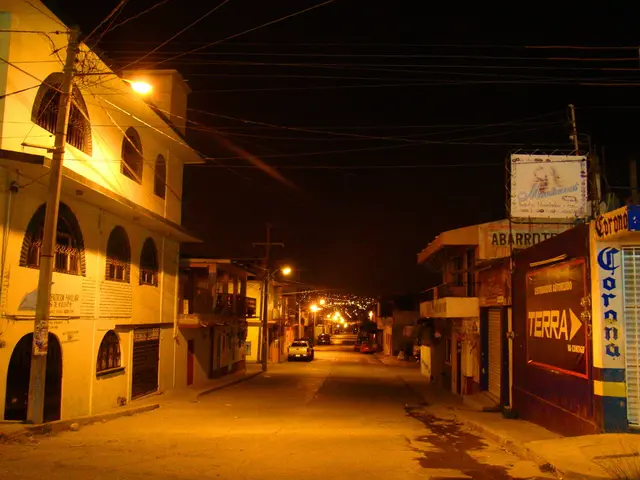Google Earth's Role Evolving: Crime Solver or Clandestine Spy?
=========================================================================
In the digital age, the line between innovation and control is a delicate one, and nowhere is this more evident than in the case of Google Earth. This powerful tool, which offers satellite images, aerial views, and 360-degree virtual tours, is more than just a map, raising questions about its potential capabilities beyond geographical navigation [1].
The debate centres around whether technologies like Google Earth serve the public interest or infringe upon individual privacy rights. On one hand, Google Earth has been instrumental in uncovering environmental violations by monitoring changes over time and has even played a role in crime-solving instances, such as locating lost persons and uncovering illegal activities [2]. On the other hand, the capability to zoom into any location on the planet raises significant privacy concerns [3].
Recent court cases, such as the one in Argentina, highlight these concerns. Google was ordered to pay $12,500 after its Street View car captured and published a naked photo of a man in his backyard [4]. The court emphasized the man’s strong expectation of privacy within his private property and criticized Google for failing to blur the image as per its usual policies, marking a failure of the company’s duty to protect individuals’ dignity [4].
Google offers users a way to protect their privacy by allowing permanent blurring of homes or vehicles on Street View through a “Report a problem” feature. However, some experts warn that having only one blurred home on a block might attract unwanted attention from burglars or others [5]. This feature represents an attempt to balance the openness of geographic information with a user’s right to privacy.
Criticism also extends to security concerns beyond individual privacy. For example, Google Street View has been criticized for inadvertently revealing sensitive locations such as military bases, prompting Google to remove such images upon request from authorities [6]. This shows that public safety concerns can necessitate limits on what mapping technology should disclose.
As we move forward, the balancing act between crime-solving or public interest uses of tools like Google Earth and individual privacy rights involves technological measures (like automatic blurring), legal frameworks (privacy laws and court rulings), and continual challenges related to rapid image dissemination and technology limitations. Cases like the one in Argentina underscore the need for clear policies and enforcement to protect individual dignity while enabling useful geographic data [4][6].
The future might see increased integration of AI with geospatial data, leading to predictive analytics for urban development or disaster response [1]. As technology advances, so too will the need for careful consideration of the balance between security benefits and personal freedom.
References:
[1] The Guardian. (2019, September 24). Google Earth's new feature shows how AI can predict what's happening in your neighbourhood. Retrieved from https://www.theguardian.com/technology/2019/sep/24/google-earth-new-feature-shows-how-ai-can-predict-whats-happening-in-your-neighbourhood
[2] BBC News. (2014, June 2). Google Street View: 'Report a problem' tool launched. Retrieved from https://www.bbc.com/news/technology-27517515
[3] The New York Times. (2010, May 13). Google Street View: A Privacy Concern. Retrieved from https://www.nytimes.com/2010/05/14/technology/personaltech/14cnet-google.html
[4] The Washington Post. (2018, October 18). Google ordered to pay $12,500 in Argentina for revealing a naked man in Street View. Retrieved from https://www.washingtonpost.com/technology/2018/10/18/google-ordered-pay-12500-argentina-revealing-naked-man-street-view/
[5] The Verge. (2014, June 2). Google's Street View privacy tool lets you blur your house. Retrieved from https://www.theverge.com/2014/6/2/5742234/googles-street-view-privacy-tool-lets-you-blur-your-house
[6] The Associated Press. (2010, May 10). Google Street View: Images of military bases removed. Retrieved from https://apnews.com/article/567a9663455b4691b4c0c6932a2f375d
- In the realm of data-and-cloud-computing, the advancement of technology in Google Earth has led to predictions about what might happen in neighborhoods, demonstrating the potential for innovation to contribute to urban development and disaster response.
- As technology continues to evolve, the need for a balanced approach towards security benefits and personal freedom becomes increasingly important, as seen in the debate surrounding the use of gadgets like Google Earth in protecting individual privacy while meeting the public interest goals of environmental monitoring and crime-solving.
- The integration of AI with geospatial data has the potential to revolutionize various industries, but it also raises concerns about privacy, as demonstrated by the recent court case in Argentina that highlighted the need for clear policies and enforcement to protect individual dignity while ensuring the continued provision of useful geographic data.




